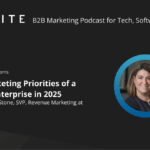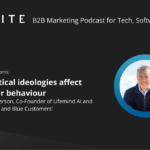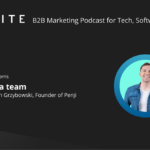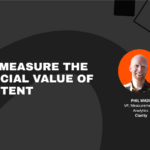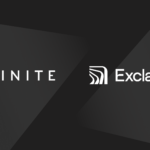Purpose-driven initiatives are on the agenda of organisations worldwide as they seek to be a part of positive change. Marketing these can be a challenge – effectiveness is threatened by scrutinous consumers and authenticity undermined by competitors.
The latest FINITE event, in partnership with FINITE partner Copyhouse, sought to address common challenges in purpose-driven marketing, and set attendees on the right path for a positive impact.
Our event was held in the beautiful Chief Clubhouse in Bloomsbury, London, where attendees met for a coffee and croissant before diving into an enthralling discussion. We were lucky to have expert panellists from a variety of backgrounds, with varying perspectives and plenty of experience with purpose-driven messaging.

The panellists were:
- Luc Berlin, Founder of Miigle+
- Luc’s high level of empathy is shaped by an internship he did in Mali. He’s a strong advocate for creating opportunities for people from minority backgrounds.
- Alex Sufit, Change Management Consultant
- Alex brings a personal passion for diversity, equity, and inclusion (DEI) to the table. As a father of a refugee, she’s deeply committed to advocating for fairness in all aspects of life.
- Kathryn Strachan, CEO at Copyhouse
- Kathryn noticed a lack of empathy in B2B interactions until the COVID-19 pandemic blurred the lines between personal and work lives and emphasised the importance of purpose-driven messaging from B2B organisations.
- Oliver Pyle-Santini, Company Owner at Treefo.co
- Oliver sees the internet as a powerful tool for uniting people with shared values, particularly when it comes to saving the environment.
Here are the key takeaways from our event on purpose-driven marketing in tech:
Why Purpose-Driven Marketing is on the Rise
- Awareness and Empowerment: There’s a greater and wider sense of awareness of issues due to social media and social movements. This empowers both individuals and organisations to take action.
- DEI as a Catalyst: The DEI movement stemmed from events like MeToo and Black Lives Matter, as these pushed organisations to take action.
- The Internet’s Role: The internet connects us all, making it an ideal platform for driving purpose-driven initiatives and enhancing the accessibility of these.
- Standing Out: The challenge of a “sea of sameness” in values and messaging means companies need to authentically communicate their core beliefs and what they’re doing to support these.
Amplifying Messages through Content
When it comes to effectively communicating purpose-driven messages through content, the panellists had some valuable insights:
- Leadership Inspiration: Kathryn stressed that leadership should inspire others within an organisation. It’s important that values and purpose be driven from the top, with consequential content authentic and genuine.
- Dedicated Platforms: Luc noted that saturated platforms pose challenges, and there’s a need for dedicated digital spaces to bring purpose-driven stories together.
- Authenticity Backed by Action: Alex cited Nationwide as an example of a company that communicates its social impact effectively by aligning actions with intentions. Authenticity, she argued, must be backed up by concrete actions.
- Blockchain for Verification: Oliver proposed using blockchain technology as a means to quantify and verify the actions taken in purpose-driven initiatives.

Overcoming DEI Challenges
The panel also discussed common DEI challenges businesses encounter:
- The Lack of a Clear “Why”: It’s important to have a clear purpose or “why” for DEI initiatives. Without one, organisations can come across as inauthentic.
- Starting at the Ground Level: Create systems that help people from minority backgrounds grow within companies. This would tackle core challenges for DEI within leadership in the long term.
- Incremental Change: Incorporating DEI when you’re building a business is often easier than changing established organisations. But that doesn’t mean large organisations shouldn’t try. They should enact incremental change with a long term lens.
Navigating the Pitfalls of “Washing”
“Washing” is a term used to consolidate green-washing, pink-washing, etc. Addressing the issue of “washing” in purpose-driven marketing, the panel offered these insights:
- Everything matters: Some companies may overstate their actions, but the intention is still there and shouldn’t be disregarded.
- Back It Up with Action: Actions should always precede communication, and authenticity is key.
- Authenticity Solves the Problem: Sharing challenges and lessons learned can make case studies more real and relatable, and can come across as more authentic with sceptical audiences.
Measuring and Reporting Impact
The panellists shared strategies for measuring and reporting the impact of initiatives:
- Utilising Monitoring Forms: Alex suggested using monitoring forms to track diversity in organisations and set benchmarks for DEI. She emphasised that especially in countries like the UK, where these forms are normalised in recruitment and onboarding, there is no excuse not to track.
- Flattening Hierarchies: Oliver envisions a flat hierarchical structure that encourages open communication within an organisation. This means all voices are heard, including minority ones.
- Tracking Progress: Kathryn recommended noting the beginning, middle, and end stages of purpose-driven initiatives to track progress effectively.
Overall, the session left us with a deeper understanding of the power of purpose-driven marketing and the challenges and opportunities it presents. Followed by a delicious breakfast in the beautiful Chief Clubhouse, it’s safe to say attendees were pleased with the morning.


